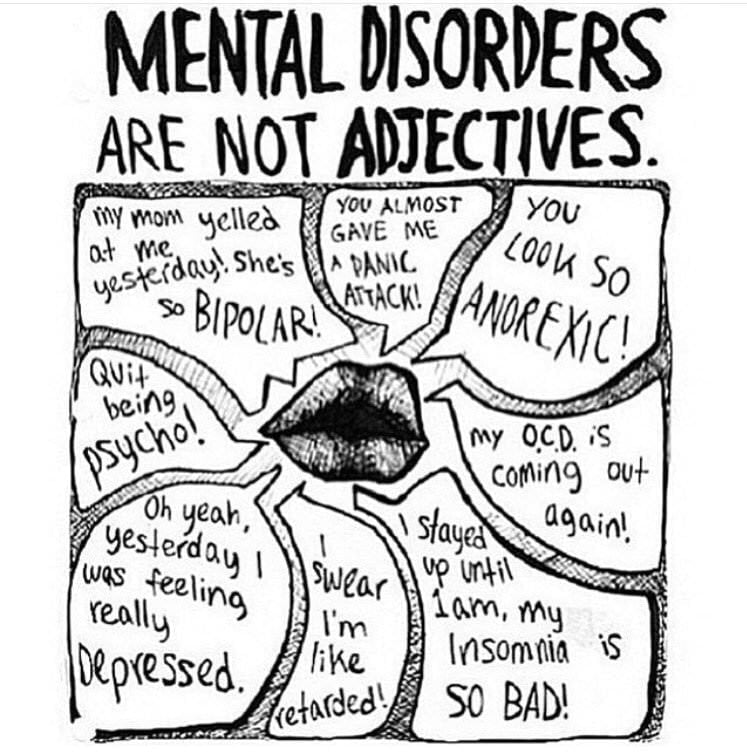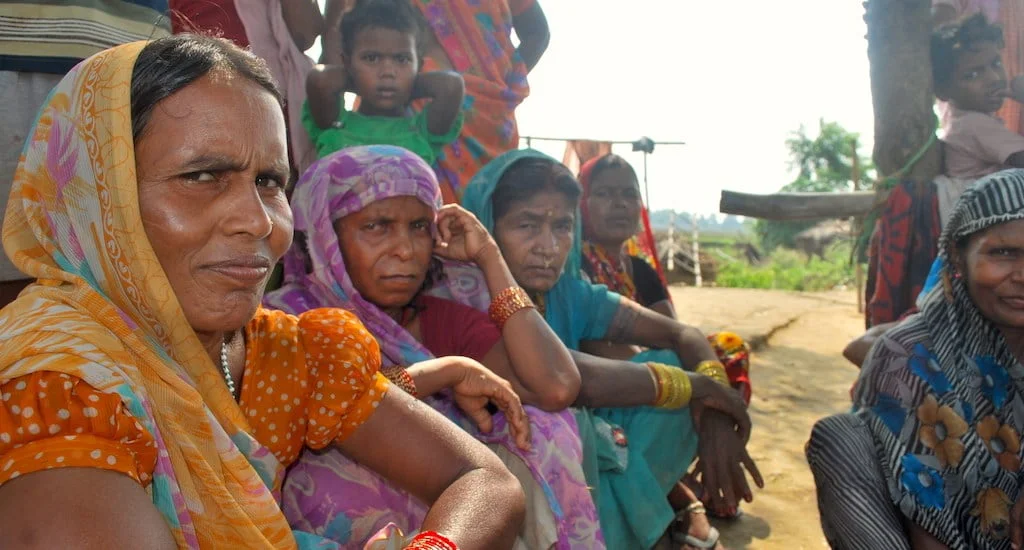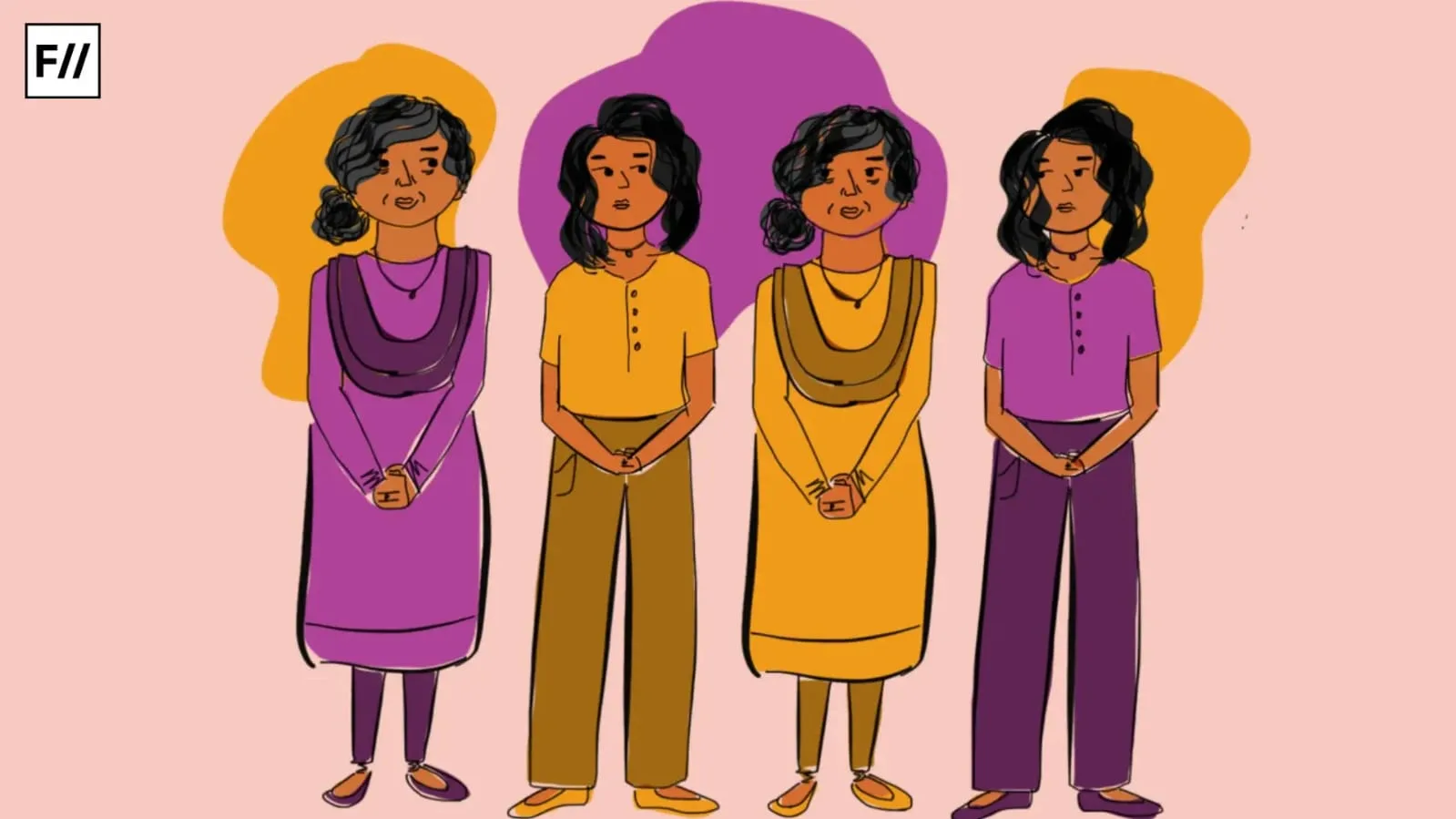I’ve heard people call that one ex of theirs who just won’t stop texting, ‘a psychopath’. People would tell my skinny best friend that she ‘looked anorexic’. If I was moody, I was ‘being bipolar’. I’ve seen clickbait, with captions like ‘Things that will drive your OCD self insane’ and if you click on the link, you find pictures of a tile out of place, or a packet of chips that’s opened upside down. I’ve had friends who said they were ‘depressed‘ because their favourite TV show ended. Most commonly, though, I’ve seen people comment on posts sharing someone’s opinion about religion and politics, with the word ‘triggered’.
But here’s the thing. Your ex most probably isn’t ‘a psychopath’, they are probably being persistent. The skinny friend I mentioned earlier? She eats like an elephant and just happens to have a fantastic metabolism. I am just a moody person and if you catch me on a bad day, god help you. But I’m not bipolar. The tile and the packet of chips made me uncomfortable, no doubt, but it didn’t drive me crazy and just because I felt uncomfortable doesn’t mean I have OCD. The same friends who were “depressed” the day their favourite show ended, were fine the next day, when they found a new series to watch. Finally, you may have been offended by someone else’s opinion, it may even have upset you, but you most likely weren’t “triggered”.
Also read: Why We Must Learn To Distinguish Between Sadness And Depression
I use words like ‘probably’ and ‘most likely’ because it’s possible for anyone to have any illness. That said, we end up using psychological terms whose meanings we don’t fully understand and cause a lot more harm than we realize. Now, I’m not saying that everyone is doing this to harm another person. It could just be a joke, or a random statement made in the moment. I know this because I’ve been that person myself. In my case, as I believe is true for most people, no one ever told me it was wrong to do this, mostly because very few people even knew.
We use words like depression, OCD, bipolar, panic attack, addiction, triggered and psychopath incorrectly because most of us feel that these words are exaggerated versions of regular words and we fail to see them as actual illnesses, usually because these illnesses are invisible to most. For most, depression is equivalent to excessive sadness, just like bipolar is excessive moodiness, and panic attacks are caused by excessive stress. What we don’t understand is that this simply isn’t true. These disorders have many symptoms and have a huge impact on the day-to-day functioning of the patient. So, reason number 1 to not use these words the way we usually do: It’s absolutely factually incorrect.
The most pressing issue is that using these terms incorrectly reiterates the notion that mental illnesses aren’t “real”. In a world filled with ignorance and stigma, things can’t change for the better when we view psychological terms as just labels that all of us have and experiences that more or less occur on a daily basis. Trivialising mental illnesses just adds to the stigma, which, in turn, makes dealing with these illnesses that much harder for the patient. Now not only does this person have an illness, they also have the guilt and shame to deal with. To top it off, they feel like they’re all alone in this, because of responses like “You’ll get over it” and “It’s not a big deal” or even “Stop overreacting” and “Don’t be so dramatic“.
Also read: 5 Mental Illness Myths We Must Do Away With
The bigger concern, however, is something known as a semantic shift. A semantic shift is the change of the meaning of a word over time. Simply put, these shifts occur when the original definition of a word and what is intended by the speaker differ from each other. The constant use of the word with this intended meaning leads to the acceptance of this new meaning and this leads to the formation of a brand new definition.
Take the word ‘gay’ for example. There was a time when it meant ‘happy’, then a time when it meant ‘promiscuous’ and here we are now, when it means ‘homosexual’. This transition didn’t really hurt anyone, because synonyms existed. Nobody minded losing that definition of ‘gay’ because that exact same emotion can be expressed with words like ‘happy’, ‘glad’ and ‘joyful’.
But when it comes to psychological terms, there are no synonyms for them. In fact, no word even comes close to describing psychological conditions perfectly. So in time, these terms will lose their original meanings and become diluted until ‘depressed’ actually does mean ‘sad’ and ‘moody’ becomes the definition of ‘bipolar’. And that is just the starting point. Things will go further south when people with these conditions won’t really have a word to describe what they’re going through, because if the word ‘depression’ means ‘sadness’, then what word means ‘depression’, the illness? Now think of this confusion with all the psychological terms we misuse.
But what’s done is done, we can’t change that. So what do we do now? Let’s unlearn everything we think we know about mental illnesses and relearn. Let’s understand and acknowledge the fact that mental illnesses are very real and we are heavily underprepared to handle them. Let’s be more sensitive, more supportive and less judgmental. And finally, let’s think twice before we say something.
Featured Image Credit: via Odyssey
About the author(s)
A triple-major graduate in Eco, Maths, and Stats trying to infuse not-so-comfortable intersectional perspectives into the comforting-yet-ignorant debates society often engages in. Sounds heavy, I know. But well, need to vent somewhere since my dog doesn't pay much heed to me.





Kudos Shelly, very well written! Great job articulating such a sensitive topic into such simple words?? We tend to use these words as adjectives in our conversations often so casually and rarely realize that it might be somebody else’s tough reality. In a society where mental illness is still not taken seriously, this article is definitely a wake up call.
Way to go Shelly?❤️
I’m so happy to receive your feedback. I’m glad you liked it! ❤️
A very thoughtful article from a keen, sensitive writer. Really liked the concept of semantic shift and the importance of synonyms in preventing the perversion of words whose meaning changes with time. Most importantly, I was really impressed by the writing style: free flowing, engaging, and good choice of words without sounding bombastic. Dil maange more!!!!
Too good! You have touched upon a very sensitive subject and written it so well and sensitively. People do use these ‘words’ loosely and become so judgmental. My best wishes to you. Keep writing Shelly! Looking forward to more ??
My thoughts exactly. I don’t think people realize the intensity of psychological disorders until they are affected by it or affected by a person who has it. And oh, you left out “narcissist”.
Well said ! High time people learnt to use words more responsibly. Good to see a young woman articulate so well on a sensitive topic. Keep writing.